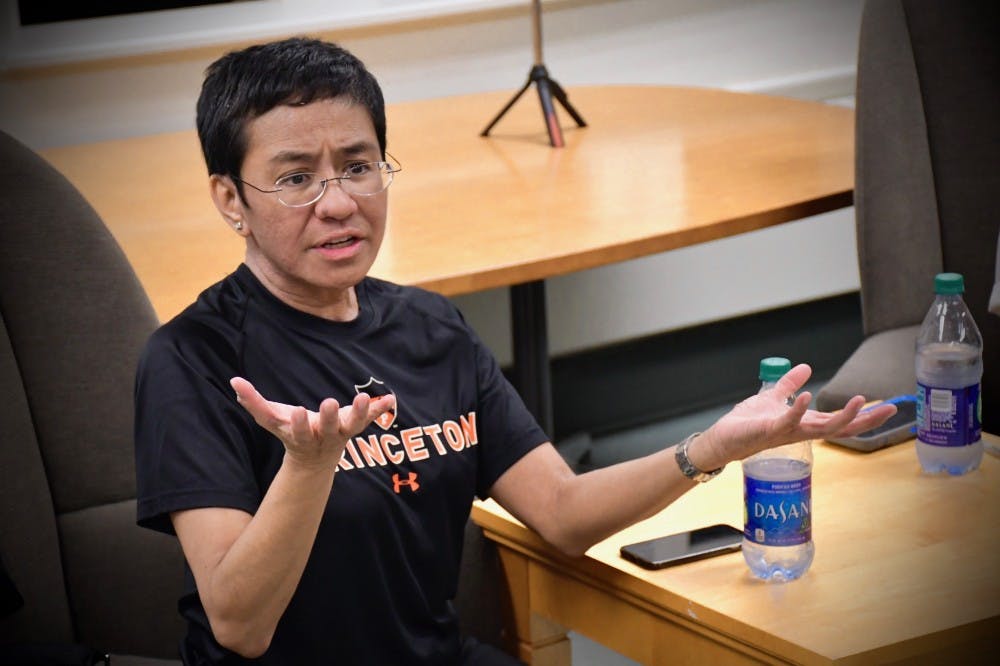In “How to Stand Up to a Dictator” by Maria Ressa ’86, Ressa writes that she was originally optimistic about the potential of social media, saying she hoped Rappler, the digital news platform that she co-founded, “would harness the social media platforms to build communities of action for better governance and stronger democracies.” But, as she learned over the course of her reporting, “the Philippines is ground zero for the terrible effects that social media can have on a nation’s institutions, its culture, and the minds of its populace.”
“How to Stand Up to a Dictator” will be the annual pre-read, assigned in the summer before their matriculation, for the Class of 2027. In a video announcing the pre-read, University President Christopher L. Eisgruber ’83 called Ressa’s book “an urgent invitation to join what [she] calls ‘the fight for our future,’ the quest to protect truth, democracy and humane understanding from the corrosive effects of online media platforms and the algorithms that drive them.”
Eisgruber chose to highlight the deleterious effects of social media in his State of the University letter earlier this year, writing that the media landscape is “flooded with the intellectual equivalent of irresistible junk food.”
Ressa was awarded the Nobel Peace Prize in 2021 for her work investigating human rights abuses, corruption, and authoritarianism in the regime of Rodrigo Duterte, the former president of the Philippines.
“Every development that happens in my country eventually happens in the rest of the world — if not tomorrow, then a year or two later,“ she writes in the book.
The book, published in September 2022, documents Ressa’s work as the co-founder of the online news site Rappler, one of the few media organizations in the Philippines to be openly critical of Duterte’s policies, including a drug war that has led to the deaths of over 12,000 people, according to Human Rights Watch.
The book also discusses how social media and disinformation have chipped away at democracy, both in the Philippines and around the world. Some of Ressa’s own reporting for Rappler focuses on the spread of government propaganda online.
Ressa herself has faced attacks from Duterte’s government, been repeatedly faced with arrest, and was recently acquitted of tax evasion charges in what the BBC called “a win for press freedom.”
The Manila-born journalist studied English at Princeton after attending high school in Toms River, N.J., before moving back to the Philippines on a Fulbright scholarship. She then worked as a correspondent for CNN, heading the network’s bureaus in Manila and Jakarta, Indonesia and covering topics such as the growth of terrorism in Southeast Asia.
Ressa has been a prominent face at Princeton in recent years. She spoke at the virtual commencement ceremony in 2020, and was honored in February 2022 with the Woodrow Wilson Award, the highest award the University can bestow on an undergraduate alumni.
Her visit to campus last year underscored the legal prosecution she faced, and is still facing, back home. Only a few hours before she was scheduled to board a flight for New York, she was blocked by a court order preventing her from leaving the Philippines. At the time, she was facing charges of cyber libel, characterized by many as retaliation for her reporting on the Duterte regime. She was cleared for travel after filing for a motion to reconsider.
Ressa, who plans to join class discussion of the book during orientation week — which will take place from Aug. 25 to Sept. 4 — will also be required to obtain court approvals from each court where she is still facing any open charge in order to travel outside of the Philippines.

This year marks the 10th anniversary of the University’s pre-read tradition. Previous titles, chosen by Eisgruber each year, include “Speak Freely: Why Universities Must Defend Free Speech” by Keith Whittington in 2018, “Stand Out of Our Light: Freedom and Resistance in the Attention Economy” by James Williams in 2019, “This America: The Case for the National” by Jill Lepore in 2020, and “Moving Up Without Losing Your Way: The Ethical Costs of Upward Mobility” by Jennifer Morton ’02 in 2021. Most recently, in 2022, the pre-read was “Every Day the River Changes: Four Weeks Down the Magdalena,” by Jordan Salama ’19.
The books often speak to the previous year’s events or Eisgruber’s personal interests.
Williams’s book was chosen amid a rising footprint for technology on campus and across the nation. The book “launche[d] a plea to society and to the tech industry to help ensure that the technology we all carry with us everyday does not distract us from pursuing our true goals in life,” and explained how as information is becoming more abundant, our attention is becoming more scarce.
Whittington’s book reflected ongoing debate about free speech on campus. He argued that universities must protect and encourage free speech, and follow their mission to promote freedom of thought as well as ideological diversity.
According to Eisgruber, Lepore’s book addressed the question, “How can Americans, and the people of other nations, see themselves as united in a shared quest for the common good despite differences and disagreements that might pull them apart?” The book came after the George Floyd protests in 2020.
Morton’s book focused on her students’ experiences, as well as her own memories of coming to Princeton, including the challenges that she faced. It discusses the ethical and emotional tolls that “disadvantaged college students face” when seeking upward mobility, and how they can flourish.
Eisgruber said that in Salama’s book, he “engages energetically and imaginatively with the places that he visits. He is fully present to the people he meets and he lets them be fully present to him.” This book was announced as the choice after many University COVID-19 restrictions were lifted.
During orientation, members of the incoming class gather to discuss the pre-read with the author in a large auditorium on campus. Last year, the event was held in Jadwin Gym. After the discussion, zee groups further talk about the pre-read in a small group setting.
Miriam Waldvogel is an assistant news editor for the ‘Prince.’
Correction: A previous version of this piece incorrectly listed the previous pre-reads for 2018 and 2019.
Please send any corrections to corrections[at]dailyprincetonian.com.








